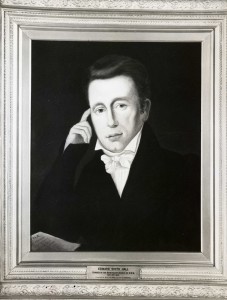Today is the 200th birthday of The Benevolent Society. Greg Clarke reflects on this milestone and Bible Society’s connection to the celebration.
In 1813, a free settler named Edward Smith Hall began what is known today as The Benevolent Society, which has a rightful claim to being Australia’s first charity. Across the last 200 years, it has been a powerful source for good in New South Wales and now further afield.
It describes itself as “an independent, non-religious, non-profit organisation”, emphasising that it exists for the benefit of anyone in need, and is not driven by creed or dollar.

Edward Hall Smith helped form the Benevolent Society of New South Wales. He was also a founder in 1817 of the New South Wales auxiliary of the British and Foreign Bible Society.
However, as the Benevolent Society’s website notes, the Christian religion was essential to the way it began. On 5th June 1818, it was actually the Bible Society that formed the Benevolent Society, assisting Edward Smith Hall to re-establish his private charity as a larger and more effective organisation that could reach the growing needs of the six districts of Sydney Town. Governor Lachlan Macquarie was the patron of both.
This shared history delights me, because it provides an excellent Australian expression of the way Christian teaching and social service go hand in hand. The work of the Bible Society (distributing the word of God to anyone and everyone who doesn’t have it) naturally led to the work of the Benevolent Society (intentional advocacy for the poor and oppressed, as well as practical provision of their needs). When the message of God’s love for all people takes hold of the hearts and minds who hear it, it results in the kind of actions for which the charities of our nation are famous.
The Benevolent Society led the way in caring for orphans, establishing hospitals (known as ‘asylums’, without the connotations that word has today) for the disabled and for pregnant women, and campaigning for the old-age pension. These are all activities directly or indirectly mandated by the teachings of the Bible, both Old and New Testaments. And although these activities are carried out by both Christian believers and other compassionate citizens alike, it can fairly be claimed that it was the Christian worldview that kick-started and sustained these particular adventures in benevolence.
As the first regulation recorded back in June 1818 states, the Society would “afford them religious instruction and consolation in their distresses”, a clear statement of the gospel motivations behind this wonderful new institution.
In 21st century Australia, it has become difficult to talk honestly and openly about this Christian “shape” to the history of charity in our nation. I’m not entirely sure why, because overall it has been a blessing. When Christians are reading their Bibles well and putting its teachings into practice in society, the result is always a more caring, well-organised and socially supportive environment. History reveals that to be true; unfortunately, it can be a tough truth to communicate these days.
I join the celebration of the Benevolent Society’s bicentenary, along with all Australians who love charity and compassion. But I long for a time when Christianity is once again seen as the dynamic of benevolence that Jesus and his Bible intended: “So in everything, do to others what you would have them do to you, for this sums up the Law and the Prophets” (Matthew 7:12).
In Melbourne this month, just one day after the Benevolent Society’s 200th birthday, I have the privilege of speaking at the River of Life conference about the way the Bible can shape an Aussie’s working life. In the history of the Benevolent Society, we find fabulous examples of this very shaping; but Christians need to do more to make it apparent that the teachings of the Good Book are behind so much of the good work that gets done.
Greg Clarke is CEO of Bible Society Australia.
Top Image: Horse and cart delivering bread outside the Grocery Department of the Temporary Stores Building, Valentine Lane, 1903.
Email This Story
Why not send this to a friend?
